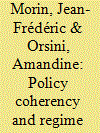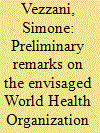| Srl | Item |
| 1 |
ID:
131708


|
|
|
|
|
| Publication |
2014.
|
| Summary/Abstract |
This study argues that 'regime complexes' and 'policy coherence' are two faces of the same integrative process. The development of regime complexes co-evolves with the pressures on decision makers to coordinate their policies in various issue-areas. Conceptually, we introduce a typology of policy coherency (erratic, strategic, functionalistic, and systemic) according to its procedural and substantive components. Empirically, by triangulating quantitative and qualitative data, we use this typology for the case of the genetic resources' regime complex to illustrate the links between regime complexes and policy coherency. Our results suggest that a coherent policymaking process favours integrated regime complexes, while greater exposure to a regime complex increases the pressure to have a coherent policymaking. This study fills a gap in the literature on regime complexes by providing a micro-macro model linking structure to agency.
|
|
|
|
|
|
|
|
|
|
|
|
|
|
|
|
| 2 |
ID:
100068


|
|
|
|
|
| Publication |
2010.
|
| Summary/Abstract |
Over the last few decades, the World Health Organization (WHO) has played a significant role in the prevention and control of new strains of influenza virus in the human population. Beginning in the 1950s, it has coordinated a network of WHO-linked laboratories, charged with monitoring the changes in influenza viruses and favouring the timely sharing of virus samples, which is necessary for the development and production of vaccines. In December 2006, the said system was brought into question by Indonesia, according to which it was unfair and in conflict with the principle of state sovereignty over biological and genetic resources. Although very controversial, the Indonesian decision to interrupt the supply of candidate influenza vaccine strains boosted intergovernmental negotiation, until then not achieved, aimed at establishing a new WHO framework. This article examines the outcome of such a negotiation, as well as the aspects of the framework still under discussion. It emphasizes the innovative nature of the proposed benefit-sharing mechanism, which would promote access to vaccines mainly through the multilateralization of intellectual property rights governance. Similarities and differences between the envisaged framework and the benefit-sharing mechanism established by the Food and Agricultural Organization International Treaty on Plant Genetic Resources for Food and Agriculture in the field of access to plant genetic resources are analysed.
|
|
|
|
|
|
|
|
|
|
|
|
|
|
|
|
| 3 |
ID:
053441


|
|
|